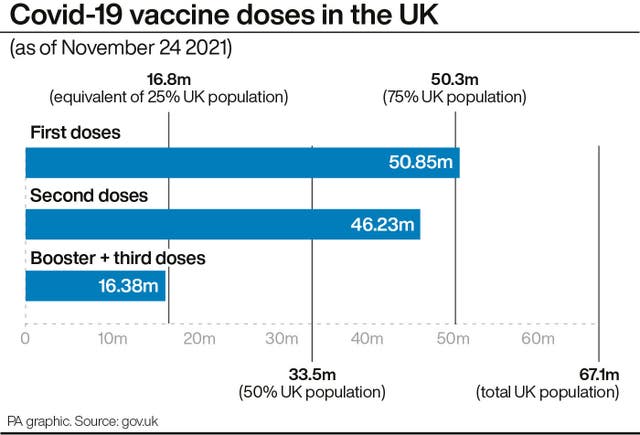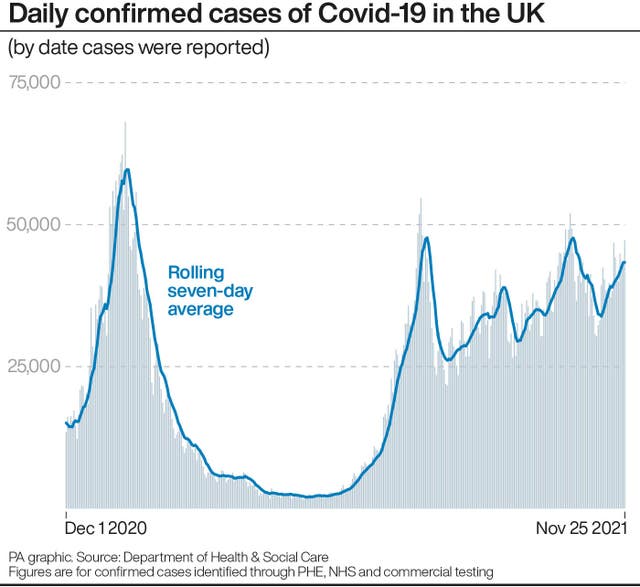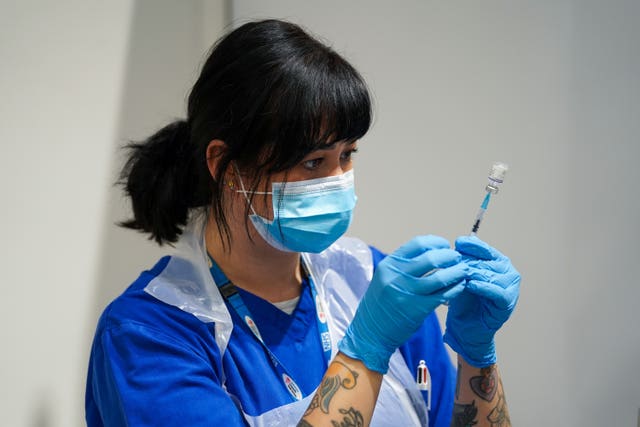Nearly half a million Europeans aged 60 and over saved by Covid-19 jabs – study
Figures have been calculated by the World Health Organisation Regional Office for Europe and the European Centre for Disease Prevention and Control.

Nearly half a million people aged 60 and over have been saved from dying due to Covid-19 as a result of being vaccinated, according to a European study.
Researchers from the World Health Organisation (WHO) Regional Office for Europe and the European Centre for Disease Prevention and Control (ECDC) have estimated 470,000 people have been protected against dying from Covid-19 after being vaccinated.
For their study, which has been published in the Eurosurveillance medical journal, the authors estimated the number of deaths among adults aged 60 and older in 33 countries in Europe that would have taken place without any vaccines, using the weekly reported death counts.
They then calculated the number of lives saved due to Covid-19 vaccines as the difference between these estimates and the reported number of deaths from December 2020 to November 2021 for those aged 60 and over.
The researchers estimated that Covid-19 vaccines saved 469,186 lives in this age group in the nations during the study period – reducing the expected number of deaths by roughly half.
Uptake of vaccines for people aged 60 and over in the nations ranges from 20% to 100%.
The authors estimated the largest number of lives saved was highest in the nations where the vaccine rollout was early and uptake was high.
Other countries experienced limited effects of vaccination because their vaccine rollout was either slower or rolled out in parallel with effective public health measures.
The study did not take into account lives saved from the indirect effect of vaccination because of a reduction in transmission.
The 33 countries analysed were Iceland, Israel, Norway, Malta, Spain, Finland, Ireland, England, Cyprus, Portugal, Greece, France, Austria, Belgium, Italy, Luxembourg, Sweden, Hungary, Lithuania, Switzerland, Estonia, North Macedonia, Montenegro, Slovenia, Poland, Czech Republic, Croatia, Latvia, Romania, Slovakia, Moldova, Ukraine and Scotland.

Frank and Barbara Durrant, from east Devon, both caught Covid-19 after their second jabs but found they did not have severe symptoms.
Mrs Durrant, 74, said: “I contracted Covid-19 approximately five weeks ago and suffered only a mild cold and loss of taste for a couple of weeks.
“I feel quite sure that being double vaccinated saved me from being much more seriously affected. Sadly, I lost a very dear, very fit friend who died of the virus before the vaccine was available. She had no choice.”
Mr Durrant, 78, said: “Having received my second vaccination, I caught Covid-19 following an extended time spent in close contact with a friend who had the virus.
“The symptoms were so mild that were it not for a positive test I would have considered myself to have been fully fit. I attribute this, without doubt, to the fact that I had been doubly vaccinated.”
According to the WHO, more than 1.5 million people have died after contracting Covid-19 since December 2019 in the WHO European Region.

More than 90% of those who died were aged 60 and above.
Dr Hans Henri P Kluge, WHO regional director for Europe, said vaccines need to be given alongside other public health measures.
“Wear a mask in crowded, closed and confined spaces, cover coughs and sneezes, keep physical distance from other people and wash your hands regularly,” he said.
“Ventilation is important too, so if it’s safe to do so open a window or a door to let in fresh air. It’s important that authorities take these measures and that we do all of these for the protection of ourselves and others, even if we are fully vaccinated, because based on the available evidence vaccination greatly reduces but cannot stop virus transmission altogether.”
Professor Stephen Powis, national medical director of NHS England, said 95 million jabs have now been given across England in less than a year, saving thousands of lives.
He urged people who are not yet vaccinated or who have not got their booster jabs to go out and get one.
Prof Powis said: “Thanks to the hard work of NHS staff and volunteers, we have carried out almost two million vaccinations a week on average since the largest vaccination drive in NHS history began last December – with more sites than ever delivering jabs across the country, including in schools, pharmacies, hospital hubs and walk-in sites, as we deliver hundreds of thousands of first and second doses, boosters and third doses every day.”

Latest Government figures show 50,852,133 first doses of Covid-19 vaccine had been delivered in the UK by November 24.
A total of 46,232,258 second doses have been delivered while a combined total of 16,383,575 booster and third doses have also been given.
As of Thursday, the total number of deaths within 28 days of testing positive in the UK for Covid-19 is 144,433.
Following the discovery of a new variant of Covid-19, which has been identified in cases in South Africa and Botswana, the Government said it is keeping it under “close investigation”.
A Number 10 spokesman said: “We continue to monitor new variants as they emerge with our partners around the world.
“We have one of the largest genomic sequencing programmes here in the UK that allows us to spot and track variants as they emerge and, as we have done throughout the pandemic, we will continue to keep an eye and keep this particular variant under investigation.”
Asked whether travel restrictions would be needed before Christmas as a result of the variant, the spokesman said: “We will continue to keep the latest situation, the latest scientific evidence and data, under review, as we have done throughout the pandemic.
“We have said before if we believe we need to take action we will, but we will continue to monitor this variant and other variants in the same way that we have done throughout the pandemic.”





